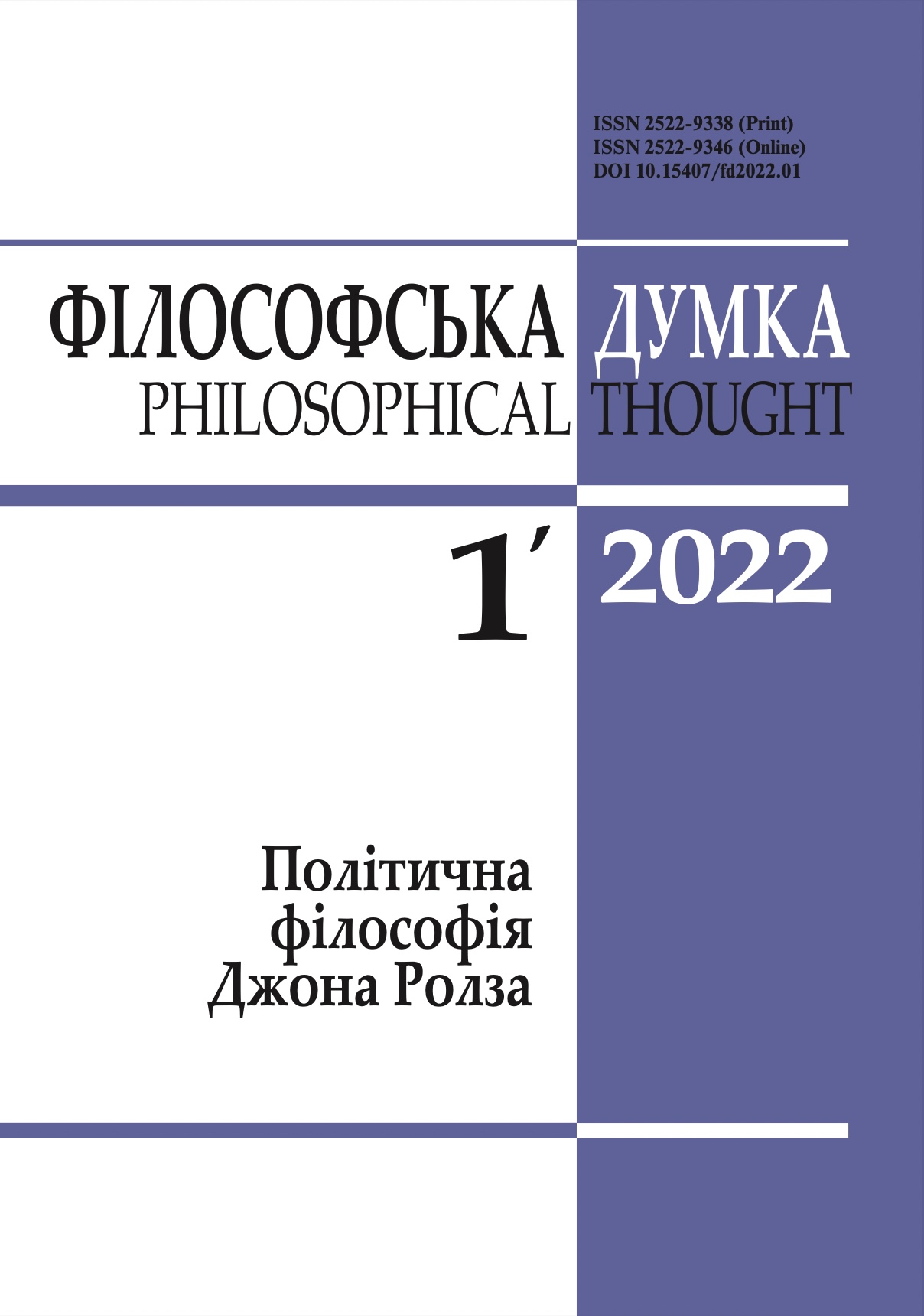ПЕРЕХРЕСНИЙ КОНСЕНСУС У ПРОСТОРІ СУСПІЛЬНОЇ МОРАЛІ (ПРО ПОЛІТИЧНИЙ КОНСТРУКТИВІЗМ ДЖОНА РОЛЗА)
ПОЛІТИЧНА ФІЛОСОФІЯ РОЛЗА
DOI:
https://doi.org/10.15407/fd2022.01.051Ключові слова:
перехресний консенсус, добре впорядковане суспільство, суспільна мораль, фонова культура, моральний мінімалізмАнотація
Увагу у статті зосереджено на розгляді моделі перехресного консенсусу у просторі суспільної моралі та можливостей її практичної реалізації задля розбудови суспільної згоди. У пошуках надійних механізмів суспільної єдності Джон Ролз розрізнює всеохопні моральні доктрини та політичні доктрини як переконання в межах приватної та публічної сфер відповідно. Пере- хресний консенсус забезпечує суспільну згоду в публічному просторі (щодо політичних докт- рин), залишаючи поза своєю орбітою переконання приватної сфери (всеохопні моральні докт- рини). Моральні цінності перехресного консенсусу утворюють сферу суспільної моралі, дієву в конкретно-історичному демократичному суспільстві, яке Ролз називає добре впорядкованим суспільством. Конкретно-історичний характер добре впорядкованого суспільства зумов- лений відповідною фоновою культурою, яку можна імплікувати як досвід громадянськості, визначений особливостями соціальних інституцій Модерну, що є безпосереднім іманентним духовно-ціннісним супроводом суспільного життя, фоновим щодо експліцитних ціннісно-нор- мативних програм та стратегій вчинення індивідів у суспільному житті, зорієнтованих на оптимізацію суспільної взаємодії. Моральні цінності в межах перехресного консенсусу є міні- малістськими (оскільки їх набір, спроможний об’єднати всіх членів суспільства, є базовим для них усіх, безвідносно до сповідуваних ними всеохопних доктрин, тобто змістовно бідним, ла- конічним), контекстуальними (модульними/рухливими, релевантними суспільним духовним запитам, змінюваними в ході пошуку об’єднавчого мінімуму) та універсальними в своїй зо- бов’язувальній чинності. Перехресний консенсус унеможливлює перетворення будь-якої все- охопної моральної доктрини на реґулятивну ідею суспільного життя і задає формальну гори- зонтальну суспільну взаємодію, кориґовану в режимі реального часу.
Посилання
Beck, U. (2000). The Cosmopolitan Perspective: Sociology of the second Age of Modernity. Bri- tish Journal of Sociology, 51 (1), 79-105.
https://doi.org/10.1080/000713100358444
Berlin, I. (2009). Two Concepts of Liberty. [In Ukrainian]. In: Liberalism. Anthology. / Ed. by O. Protsenko, V. Lisovyi (pp. 546-583). Kyiv: Prostir, Smoloskyp.
Forst, R. (2002). Contexts of Justice: Political Philosophy beyond Liberalism and Communitarianism /Tr. by M.M. Farrell. Berkley, Los Angeles, CA, London: University of California Press. Gellner, E. (1995). Conditions of Liberty. Civil Society and Its Rivals. [In Russian]. Moscow: Ad Marginem.
Gray, J. (2003). Enlightenment's Wake: Politics and Culture at the Close of the Modern Age. [In Russian]. Moscow: Praksis.
https://doi.org/10.4324/9780203450635
Iliinskaia, S.G. (2009). Conditions of tolerance in structure of public morals. [In Russian]. In: Public Morality: Philosophic, Normative Ethical and Applied Problems / Ed/ by R. Apressian (pp. 241-256). Moscow: Alfa-M.
Kashnikov, B. (2009). Pragmatic of Public Morality. [In Russian]. In: Public Morality: Philosophic, Normative Ethical and Applied Problems / Ed. by R. Apresian (pp. 137-154). Moscow: Alfa-M.
Krotiuk, S.F. (2007). European Integration: Success and Problems (on 50th anniversary of the European Economic Community). [In Ukrainian]. In: Kyiv International University Herald: International Relations, 5, 28-37.
O'Neill, O. (2003). Constructivism in Rawls and Kant. In: The Cambridge Companion to Rawls / Ed. by S. Freeman (pp. 347-467). Cambridge: Cambridge University Press.
https://doi.org/10.1017/CCOL0521651670.010
Putnam, R.D. (2000). Bowling Alone: The Collapse and Revival of American Community. New York, London, Toronto: Simon & Schuster.
https://doi.org/10.1145/358916.361990
Rohozha, M. (2009a). Public Morality: Collisions of Minimalism. [In Ukrainian]. Kyiv: PARAPAN.
Rohozha, M. (2009b). The Saving of Danish Jews in 1943. Socio-Ethical Case. In: Public Mora- lity: Philosophic, Normative Ethical and Applied Problems. Ed. by R. Apresian (pp. 397- 423). Moscow: Alfa-M.
Rawls, J. (1987). The Idea of an Overlapping Consensus. Oxford Journal of Legal Studies, 7 (1), 1-25.
https://doi.org/10.1093/ojls/7.1.1
Rawls, J. (2000). Political Liberalism. [In Ukrainian]. Kyiv: Osnovy.
Rawls, J. (2001). A Theory of Justice. [In Ukrainian]. Kyiv: Osnovy.
Rawls, J. (2009). Justice as Fairness: Political, not Metaphysical / Tr. by V. Lisovyi. [In Ukrainian].
In: Liberalism. Anthology / Ed. by O. Protsenko, V. Lisovyi (pp. 801-824). Kyiv: Prostir, Smoloskyp.
Schmitt, C. (2006). The Leviathan in the State Theory of Thomas Hobbes. [In Russian]. S.-Petersburg: Vladimir Dal'.
Walzer, M. (2000). On Toleration. [In Russian]. Moscow: Ideia-Press, Dom intellektual'noi knigi.
Walzer, M. (1994). Moral Minimalism. In: M. Walzer, Thick and Thin: Moral Argument of Home and Abroad (pp. 1-19). Notre Dame: University of Notre Dame Press.
##submission.downloads##
-
PDF
Завантажень: 301
Опубліковано
Як цитувати
Номер
Розділ
Ліцензія
Автори, які публікуються у цьому журналі, згодні з наступними умовами:
- Автори зберігають авторське право і надають журналу право першої публікації.
- Автори можуть укладати окремі, додаткові договірні угоди з неексклюзивного поширення опублікованої журналом версії статті (наприклад, розмістити її в інститутському репозиторії або опублікувати її в книзі), з визнанням її первісної публікації в цьому журналі.
- Авторам дозволяється і рекомендується розміщувати їхню роботу в Інтернеті (наприклад, в інституційних сховищах або на їхньому сайті) до і під час процесу подачі, так як це може привести до продуктивних обмінів, а також скорішого і ширшого цитування опублікованих робіт (див. вплив відкритого доступу).


